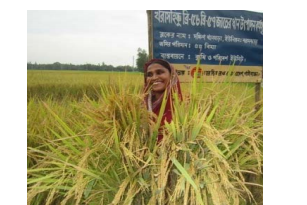Agricultural development in North West Bangladesh can be best addressed through promoting relevant technologies, better extension approaches and facilitating institutional change. Mamunur Rashid,Agriculture and Environment Coordinator, RDRS, Bangladesh.
What are the challenges in agriculture in North‐West Bangladesh?
The North‐West Bangladesh (NWB) is historically more neglected and poor. Rural livelihoods in this region are heavily dependent on agriculture. In Rangpur division alone, there are about 2.6 million farm families and of these about 27% are landless, 36% are marginal and 23% are small. Farmers face several challenges and these include: highly acidic soils (average soil PH is less than 5.5), extensive flooding (flash floods affecting 40,000 ha of rainfed rice annually), increasing climate variability (affecting wheat and rice production), depleting water tables (due to increase in boro rice cultivation), exploitation by market intermediaries (especially in potato due to low bargaining power of small farmers and lack of farmer organizations) and lack of poor uptake of new technology (mainly due to lack of effective extension and advisory support).
Which are the major organizations working for agricultural development in this region and what roles do they play?
Government agencies especially the Department of Agricultural Extension (DAE), Department of Fisheries (DoF) and Department of Livestock Service (DLS) play an important role in agricultural development in the region. These agencies have offices upto the upazila (sub‐district) level and implement a number of programmes that involve distribution of inputs and organsation of training and demonstrations. Several NGOs especially RDRS, BRAC, CARE, Practical Action Bangladesh (PAB) and iDE (International Development Enterprise) work on agriculture. Most of them are involved in skill development, organizing farmer groups, conducting demonstrations and
Government agencies especially the Department of Agricultural Extension (DAE), Department of Fisheries (DoF) and Department of Livestock Service (DLS) play an important role in agricultural development in the region. These agencies have offices upto the upazila (sub‐district) level and implement a number of programmes that involve distribution of inputs and organsation of training and demonstrations. Several NGOs especially RDRS, BRAC, CARE, Practical Action Bangladesh (PAB) and iDE (International Development Enterprise) work on agriculture. Most of them are involved in skill development, organizing farmer groups, conducting demonstrations and supporting establishment of market linkages. Private companies that are involved in seeds, pesticides, fertilizers and micro‐nutrient business also provide information to farmers on their products and their use, mainly through their dealers.
Besides these, the regional centers of Bangladesh Rice Research Institute (BRRI), Bangladesh Agricultural Research Institute (BARI), and Bangladesh Institute of Nuclear Agriculture (BINA) in this region carry out research on agriculture. These centres also work with farmers for establishing adaptive research trails. NGOs like RDRS also use their trial plots (on‐farm and off‐farm) to learn about new technologies and agricultural practices.
What is the current status of agricultural extension in NWB?
| Drought tolerant BRRI Dhan 56 and BRRI Dhan 57 promoted by RDRS in Rangpur division of Bangladesh |
Though millions of families are involved in agriculture, only few organisations are working for agricultural extension service delivery. Government extension agencies are not able to reach all farmers with new information and technologies due to their limited manpower.
Only the Department of Agricultural Extension (DAE) has staff up to the union level. Other agencies such as Department of Fisheries (DoF) and Department of Livestock Service (DLS) are not present at the union level. NGOs mostly focus on homestead based agricultural activities and their coverage is limited.
What are the current challenges faced by extensionists in the region?
Timely and efficient extension delivery is very important for agricultural development. Different organizations have been employing their own approaches for extending agricultural services. But lack of cooperation and coordination among different agencies quite often creates confusion at farmers’ level. There is a need to create a platform comprising different agencies that regularly meet to share details of their programmes (purpose, priorities, locations, clients, lessons, good practices etc) and this can definitely help in bringing some co‐ordination among these agencies.
Extensionists are fully dependent on research institutions for receiving information about new technologies. But lack of formal linkages between researchers and extensionists affects proper dissemination of information at the farm level. Lack of mechanisms to continuously upgrade the knowledge and skills of extension staff is another major challenge. Quite often extensionists are unable to participate in workshops and seminars due to lack of financial resources.
Box 1 RDRS
RDRS Bangladesh was established in 1972 to support rehabilitation of refugees in the Rangpur and Dinazpur areas, from the War of Liberation. In 1976, a sectoral development programme was launched to assist the poorest in agriculture, community development, health and women’s economic activities. Since then it has evolved as multi‐sectoral rural development NGO working on four strategic priority areas; civil empowerment; quality of life (particularly in health and education); natural resources and the environment; and economic empowerment. Currently it operates in 64 sub‐districts and 475 Union Councils (spread over 16 districts) in the northern region and work with over 410,000 households of which more than 85% are women. RDRS works with rural poor farm households and their organizations to build awareness and skills to combat food insecurity, to promote climate change adaptation and mitigation, introduce improved practices and technologies and encourage access to Government services and resources and improve their livelihoods and resilience.
What roles RDRS play for agricultural development in the region?
RDRS (Box 1) has been working in this region since 1972. Since then, agriculture development has been one of its prime activities. Initially it focused on helping individual farmers but subsequently shifted its approach to working with farmer groups. Since 2004 RDRS has been following the Farmer Field School (FFS) approach.
FFS session underway in Tangonmari village of Panchagarh district in Bangladesh
Each Union Federation (Box 2) has a farmer forum comprising representatives of farmers who are members of respective Union Federations. Currently FFS activities are implemented through the “Farmers Forums” of respective Union Federations under direct supervision of RDRS staff. RDRS is also trying to raise the voice of farmers on their rights and entitlements through their Union Federations.
As part of the FFS approach, monthly learning sessions are conducted by the RDRS staff. It organizes skill training for members of Farmers Forum and Farmer Promoter of each FFS group. After providing these skill trainings, demonstration plots are established on new technologies such as stress tolerant rice cultivation, sustainable
Box 2. The Union Federations (UF)
RDRS established Union Federations (UFs) as grassroots association of poor people to help them attain grater collective strength, improved cooperation and unity and to evolves as a more productive agency for achieving broader objectives of sustainable development on behalf of their membership and community. Villagers are brought together into groups of 15‐20 members. All groups in a Union are federated to form a Union Federation (UF). RDRS is playing the “partner‐guardian” role until the federations are adequately developed and become capable of managing their affairs independently.
cropping pattern intensification, rice cum fish culture, promotion conservation agriculture etc. In addition, a study plot is established for each FFS group, which would be managed by the respective Farmer Promoter. These Farmer Promoters are responsible for conducting the FFS session with the help of RDRS staff along with Government extension staff. These farmer promoters are recognized by the community and acts as local extensionists. Farmers from even neighboring villages are receiving new knowledge from these farmer promoters after observing their study plot/demonstrations.
RDRS has also established information centers at each Union Federation Moreover, it has been organising exposure visits and field days to achieve wider dissemination of new technologies.
Do you partner with other extension providers and if so how?
RDRS had developed the Focal Areas Forum in 2004 under PETRRA (Poverty Elimination through Rice Research Assistance) project sponsored by BRRI/IRRI/DFID. Partners of the PETRRA project are the members of this Forum. After completion of that Project, RDRS expanded its partnership with local NGOs for extending agricultural service and for implementing its FFS approach.
As discussed earlier, RDRS is working with Farmers Forum of Union Federations. It has also entered into partnership with research organization like IRRI, BARI, BRRI, BINA CIMMYT, FAO, IFAD and also universities such as Cornell
University, Bangladesh Agricultural University (BAU) and Bangabandhu Sheikh Mujibur Rahman Agricultural University (BSMRAU) which are involved in agricultural technology development. As a local partner, RDRS works with these agencies in adaptive research programmes as well as technology dissemination activities.
What are your general suggestions for agricultural development in NWB?
Agricultural development in North West Bangladesh can be best addressed through interventions in three areas. Firstly, promotion of technologies related to conservation agriculture, integrated pest and nutrient management,
Potato storage structure for village conditions developed and promoted by RDRS in Rangpur district of Bangladesh
application of bio‐pesticides, sustainable and climate resilient cropping intensification and balanced fertilizer use application needs to be promoted. Supply of quality seeds needs to be ensured and preservation of quality seeds at the farm level needs to be promoted. Efforts should also be made to increase the supply of quality seeds and promotion of quality seed preservation at farmers’ level. Efforts should be made to increase rice cultivation in aus (semi monsoon rice transplanted in April‐May) and reduce rice under boro (irrigated rice transplanted in January‐February) to cut down the use of ground water.
Secondly, extension should focus on forming farmer groups and farmer organizations and enhance their capacities. Farmer Field School is a promising extension approach for strengthening the technical skills of farmers. Similarly capacities of extension staff (working at different organizations) also need considerable strengthening. Creating a network of extension staff and developing a platform for sharing experiences and supporting each other may go a long way in enhancing their capacities.
Thirdly, there should be a mechanism to strengthen interactions and linkages among the different agencies working for agricultural development. Developing a coordination mechanism to link these different agencies might help in ensuring better coverage, reducing duplication of efforts and bringing the much needed synergy for agricultural development.





Add Comment